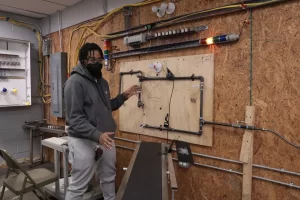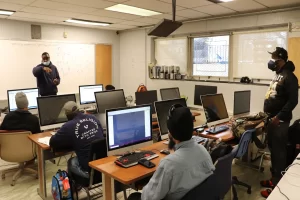Many people believe that a college degree is necessary in order to get the highest paying trade jobs. But possibilities in high-demand and highest paying trade jobs are available without a bachelor’s degree. A typical four-year degree is also substantially more time and financially expensive to finish than a trade school.A variety of well-paying trade occupations, such as construction management, electrical and electronic engineering, boilermaking, and radiation therapy, are covered in vocational schools.
The trade jobs with the greatest income are listed in this guide in order of pay. Current BLS forecasts for median annual incomes and job growth for the most popular trade vocations are taken into account in our methodology.
Required Education: Associate degree
Average Annual Salary: $97,180
Construction managers oversee public, commercial, residential, and industrial construction projects. This is one of the highest-paying skilled trade jobs. They direct projects from beginning to conclusion and are also known as project managers and general contractors.
They are in charge of creating estimates, assigning subcontractors, addressing issues, and reporting to clients. Skills in business, leadership, technology, and communication are necessary for construction management.
The majority of construction managers work for themselves, while the remainder are employed by the heavy and civil engineering construction, residential and nonresidential building, and self-employed building sectors. Graduates from vocational schools in construction management are trained to manage construction crews, create budgets, and comprehend technical drawings.
Construction managers should possess at least an associate’s degree and practical experience. By acquiring a bachelor’s, they can increase their income potential and take on bigger assignments. Additionally, improving career prospects is earning a professional certification from the Construction Management Association of America or the American Institute of Contractors. Some states demand licenses for construction managers.
Required Education: Associate degree
Average Annual Salary: $67,550
These specialists assist engineers in the development of electrical and electronic gadgets such as computers, health monitoring systems, and navigational equipment. Building electrical instruments, creating schematics, utilizing machine tools to make parts, and performing preventative maintenance are examples of typical tasks.
Technicians in electrical and electronics engineering are employed by the federal government, engineering services, industry, and research and development.Students learn how to read engineering instructions and drawings, create reports, and record data in learning trade school.
They enroll in physics, computer programming, electronics, and chemistry courses. Technicians in electrical and electronic engineering require mechanical, logical, and observational abilities. Technicians can seek certifications from the National Institute for Certification in Engineering Technologies, the International Society of Automation, and ETA International to show that they have advanced professional expertise.

Required Education: Associate degree
Average Annual Salary: $66,680
Technicians and mechanics who work on avionics and aircraft undertake maintenance and repairs. Some conduct airplane inspections in accordance with Federal Aviation Administration (FAA) guidelines. Finding electrical and mechanical issues, fixing aircraft parts, and testing aircraft components all fall within the purview of aircraft mechanics. Avionics technicians maintain records, set up instrument panels, test electronic equipment, and fix broken parts.
Manufacturers of aircraft components, the federal government, and companies that provide air transportation support services and scheduled air transportation are among the major employment. Nearby big airports typically have airfields, hangars, and repair facilities where workers are located. Most mechanics and technicians who work on aircraft and avionics equipment enroll in and graduate from a school to build a career in trades for aviation maintenance that has FAA approval. A FAA certification is required for aircraft mechanics, otherwise they may work under a certified mechanic’s supervision. Excellent professional progression opportunities are available to mechanics with inspector authorization.
Required Education: High school diploma
Average Annual Salary: $62,860
Construction and building inspectors make sure that building projects adhere to zoning laws, building ordinances, and other rules. Their time is spent at construction sites where they examine roads, bridges, buildings, and water systems. They also check the plumbing, heating, and air conditioning systems. Other duties include approving building designs, checking for issues with plumbing and electrical systems, and sending notices to buildings that aren’t compliant.
Building, electrical, and residential inspections are among the areas of expertise for construction and building inspectors. They are employed by the municipal or state government, engineering firms, building corporations, or they work for themselves. Building code interpretation and inspection techniques are taught to students in trade programs for construction and building inspection. Building and construction inspectors are typically required to be licensed or certified and to participate in continuing education programmes. The best opportunities for promotion can come from acquiring more training and work experience in the industry.

Required Education: High school diploma (min)
Average Annual Salary: $56,900
Building electrical power, lighting, communication, and control systems are installed, repaired, and maintained by electricians. Apprenticeships are normally completed by trainees after four or five years. Some enroll in a technical course that covers fundamental electrical knowledge, circuitry, and safety before beginning a shorter apprenticeship.
Apprenticeships for electricians include paid technical teaching and on-the-job training. If they graduate from a best trade school, electricians may be eligible for a shorter apprenticeship. They acquire knowledge of soldering, electrical code requirements, fire alarm systems, and blueprint reading. Apprenticeship programmes for electricians are provided by unions and contractor groups. After completing their apprenticeships, electricians can become journeymen employees and operate independently. Although requirements differ by state, most call for electricians to pass a test and obtain a license. After completing a predetermined number of field hours, electricians can graduate from journeyman to master electricians.
Read More